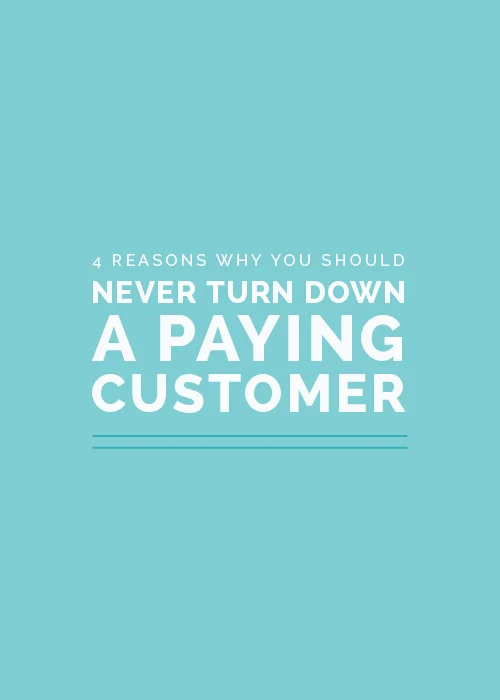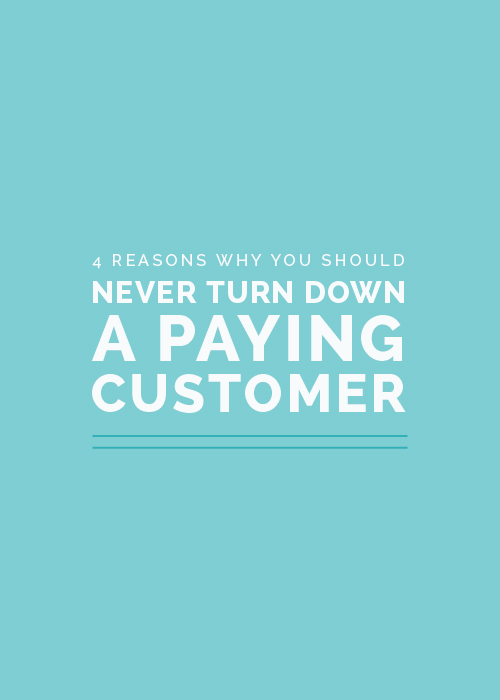There's a common train of thought that's catching on across the creative industry and advises business owners to pick and choose who they should work with. And while I agree with branding a business to attract an ideal customer within its niche, I disagree with turning down paying clients who desire to work with you. Today I'm offering an alternative point of view on this controversial topic, not to create a heated debate, but to encourage you to be purposeful and well-informed on the decisions you make for your business.
Before I jump in with my reasons, it's important to note a couple things that I do not mean by never turning down a paying customer.
Never turning down a paying customer does not mean...
...taking on customers that you disagree with morally or ethically. If someone is asking you to perform a service or conduct your business in a way that conflicts with your morals, or ethics, it's best to turn them down and refer them elsewhere.
...coming down on your prices. Your time and effort is valuable. Never turning down a paying customer does not mean taking on paying customers at price points that are lower than what you're currently charging.
...agreeing to provide products or services that aren't a part of your business model. It's wise to narrow the scope of your business and find a niche. If someone is asking you to do something completely outside of your current offerings that will conflict with your mission statement and business model, it's best to turn them down.
I've turned down numerous inquiries due to a lower price point or a request for something that's out of the scope of my services, but I've never turned down a prospective client because they were less than my ideal client. And here's why.
1 | You can't judge a book by it's cover
We can all agree that you can't judge something - especially a person - by an initial email or 20-minute phone conversation. It's difficult to predict how an entire project could pan out from a simple inquiry, and it seems wrong to turn down someone who wants to work with you based off of a first impression.
Have you ever booked a client who seemed like the perfect fit, only to be proven wrong after a day or two of working with them? If you only work with people who rub you the right way from the start, you might never experience the opposite: clients who may not have been your ideal and didn't have the chance to prove you wrong.
In my 6 years of freelance design experience, I can tell you of numerous clients who might not have been what I had in mind when thinking about my ideal design client, but they turned out to be wonderful to work with and left me with designs and experience that I'm proud to display in my portfolio.
2 | You could be passing up on a big opportunity
In last week's post, Creative Entrepreneurs: Don't Make These 15 Common Business Mistakes, I referenced a fantastic article on Entrepreneur.com by Steve Tobak called Never Turn Down a Paying Customer. In the article, Tobak tells a story of Bill Gates taking on a customer that he had passed up once before because the client was less than ideal. It turns out that the customer was IBM, and that undesired project started Gates on his journey to becoming the richest man in the world.
If you're passing up paying customers purely because they don't measure up to your standard, you could be missing out on a great opportunity. A project may appear to be more of a challenge at the outset due to a difference in style or a strong personality, but you never know what could come of that working relationship. You might be cheating yourself out of an opportunity to get creative and demonstrate your versatility.
Back in my earlier freelancing days I took on a project for a client whose style was very different than mine. I agreed to the project before I understood the colors, graphics, and style they wanted, and when I left the initial meeting I was in a panic. They wanted me to do what? Had they not seen my portfolio and my design aesthetic? How was I ever going to give them something they would like and feature it on my blog (this person faithfully followed along with my blog and saw me posting all of my other freelance projects). Not only did the project push my creativity and turn out to be something I was proud of, but it ended up being the top pin from my former blog. I still see it pop up on Pinterest today! Had I refused that client from the outset, I would have missed out on thousands of pageviews from Pinterest and a handful of other design inquiries that came as a result.
3 | New businesses need money and experience
If you're new to entrepreneurship, especially if you're full-time, you may not be able to afford to be choosy about your clients. In order to pay the bills and keep the lights on, you have to work with paying customers.
I've shared this statistic before, but it's worth mentioning again: 8 out of 10 businesses fail within the first 18 months. While it might sound great to do the business you want to do and work with the people you want to work with, it's not practical, especially when you're first starting out. You may be starting your business because you're passionate about your field, but a business can't run on passion alone; you have to be bringing in money in order to keep your business afloat.
4 | We're being hired for a service
I'm going to be bold here, but sometimes we can get so concerned with our own wants that we forget that we're being hired to perform a service and meet our client's needs. We're putting ourselves out there and marketing our businesses to attract clients, and it seems a little backward to attract them only to send them away. Telling prospective clients to go elsewhere when they want to work with you, are willing to pay your prices, and identify with your services seems counterintuitive.
Furthermore, the longer I'm in business, the more I realize that my greatest source of learning comes through my clients. They challenge me to adapt and refine my creative process, and like Tobak says in his article, my clients typically know their needs and how I can serve them better than I do. When they come to me with an inquiry, they've seen something that they like and are willing to invest in.
But what about the people who don't appreciate your work? What about those who are going to cause you hours of stress, headache, and extra time? I don't believe turning clients away is the answer to these questions either, but I do think that there are a few ways to prevent their inquiries from coming your way in the first place. Here's how.
Raise your prices. If you're tired of people not taking you seriously and undervaluing your work, it might be time to raise your prices. I understand that the pricing game can be tricky, but one way to weed out those difficult clients who only want a cheap solution is to raise the cost of your services.
Make it worth your while. My dad owned a business for over 15 years while I was growing up, and his words of wisdom for a difficult customer were to make them worth your while. In other words, if a project is going to take you extra time and cause you extra stress, quote the person higher or negotiate the terms of the contract to make the project worth the extra energy.
Set boundaries. This is huge. People can't walk all over you if you don't let them. If you happen to book a difficult client, setting boundaries is your way to keep things on task and protect your time. List the terms of your working agreement in your contract and hold firm to your limits. To guard against limitless revisions in my design process, set expectations and stick to a schedule, I write out the number of revisions for each stage of my process within my contract.
All in all, if someone is willing to spend the money to work with you, identifies with your services, and doesn't challenge your morals or ethics, I don't believe in turning them down or referring them elsewhere. Each client and inquiry should be treated with respect, especially if you've done your part on the front end to bring in the clients that value your work and are excited to work with you.
What is your stance on this topic? Do you agree?















